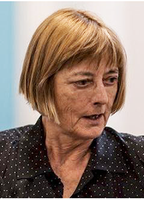Nijmegen Lectures 2018

Elena Lieven is professor in Human Communication, Development and Hearing at the University of Manchester and one of five directors of the ESRC International Center for Language and Communicative Development (LuCiD). "Elena is nationally and internationally known for her groundbreaking research in language development," says Caroline Rowland, director and head of the Language Development department at the MPI and affiliated with the Donders Institute of the Radboud University. "Elena has innovative and exciting ideas, a huge breath of knowledge, and has witnessed many significant developments in the field during her career. She’s well worth listening too."
On-going research projects of Lieven
Among other fascinating work, Elena Lieven studies how cultural differences in the upbringing of children - Western or non-Western – influence language learning widely across the world. In Nepal, she is currently working with Sabine Stoll (University of Zürich) on a project in which the daily life of children in mountain villages is filmed. The researchers then examine how the children's environment - whether they mainly talk with their parents or peers for example - influences how they pick up the grammar of the local language.
Closer to home, Lieven and her team have been following recently immigrated UK families with a Cantonese, Mandarin, or Bengali-speaking background. The families, who do not yet speak English, are compared to third or fourth generation Brits, born and bred in Manchester. How do the parents interact with their children? How do they respond to the first gestures, words and phrases of their babies and toddlers? Does the learning process in the children's brains adapt to the different parenting styles?
Lieven will take about these, amongst other hotly debated topics, during the three day event.
Nijmegen Lectures
Lieven opens the Nijmegen Lectures in the first lecture by giving her perspective on more than 50 years of research in language development, asking what insights we have gained, and whether we have, in fact, “been going round in circles” (Monday, 26 February). In the second lecture, she addresses the question of what information a child uses from the environment to master a language, and whether a perspective that puts language *use* at the heart of learning can solve the problem (Tuesday, February 27). Finally, on day three, she asks whether it is possible to compare the language development of children globally, given the huge variation we find across the languages and cultures of the world? With this theme, the Nijmegen Lectures will be closed on Wednesday, February 28th.
The Nijmegen Lectures is an annual event hosted by the Max Planck Institute for Psycholinguistics, the Donders Institute for Brain, Cognition and Behaviour and Centre for Language Studies of the Radboud University Nijmegen. It showcases the best research in linguistics from around the world. Previous lecturers include Gary Dell (University of Illinois), David Poeppel (New York University), and Elizabeth Spelke and Susan Carey (Harvard University).
More information
Nijmegen Lectures - February 26-28, 2018
- Public lectures: 10:00 - 11:30
Location: Radboud University Nijmegen, Comeniuslaan 2, Nijmegen
- Discussion sessions: 14:00 - 16:00
Location: Max Planck Institute for Psycholinguistics, Wundtlaan 1, Nijmegen
All lectures and discussion sessions are free of charge and accessible to the public.
Share this page